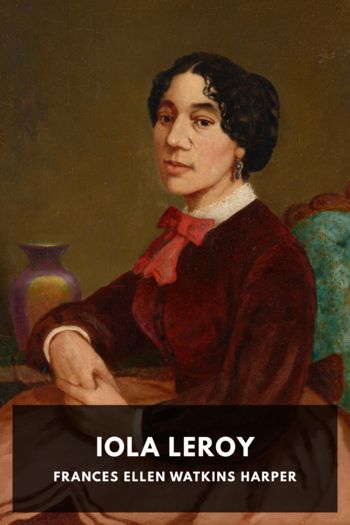Iola Leroy, Frances Ellen Watkins Harper [read aloud books .txt] 📗

- Author: Frances Ellen Watkins Harper
Book online «Iola Leroy, Frances Ellen Watkins Harper [read aloud books .txt] 📗». Author Frances Ellen Watkins Harper
Before the war she was engaged as a speaker by anti-slavery associations; since then, by appointment of the Women’s Christian Temperance Union, she has held the office of “Superintendent of Colored Work” for years. She has also held the office of one of the Directors of the Women’s Congress of the United States.
Under the auspices of these influential, earnest, and intelligent associations, she has been seen often on their platforms with the leading lady orators of the nation.
Hence, being widely known not only amongst her own race but likewise by the reformers, laboring for the salvation of the intemperate and others equally unfortunate, there is little room to doubt that the book will be in great demand and will meet with warm congratulations from a goodly number outside of the author’s social connections.
Doubtless the thousands of colored Sunday-schools in the South, in casting about for an interesting, moral storybook, full of practical lessons, will not be content to be without Iola Leroy, or Shadows Uplifted.
William Still.
Iola Leroy Or, Shadows Uplifted I Mystery of Market Speech and Prayer-Meeting“Good mornin’, Bob; how’s butter dis mornin’?”
“Fresh; just as fresh, as fresh can be.”
“Oh, glory!” said the questioner, whom we shall call Thomas Anderson, although he was known among his acquaintances as Marster Anderson’s Tom.
His informant regarding the condition of the market was Robert Johnson, who had been separated from his mother in his childhood and reared by his mistress as a favorite slave. She had fondled him as a pet animal, and even taught him to read. Notwithstanding their relation as mistress and slave, they had strong personal likings for each other.
Tom Anderson was the servant of a wealthy planter, who lived in the city of C⸺, North Carolina. This planter was quite advanced in life, but in his earlier days he had spent much of his time in talking politics in his State and National capitals in winter, and in visiting pleasure resorts and watering places in summer. His plantations were left to the care of overseers who, in their turn, employed negro drivers to aid them in the work of cultivation and discipline. But as the infirmities of age were pressing upon him he had withdrawn from active life, and given the management of his affairs into the hands of his sons. As Robert Johnson and Thomas Anderson passed homeward from the market, having bought provisions for their respective homes, they seemed to be very lighthearted and careless, chatting and joking with each other; but every now and then, after looking furtively around, one would drop into the ears of the other some news of the battle then raging between the North and South which, like two great millstones, were grinding slavery to powder.
As they passed along, they were met by another servant, who said in hurried tones, but with a glad accent in his voice:—
“Did you see de fish in de market dis mornin’? Oh, but dey war splendid, jis’ as fresh, as fresh kin be.”
“That’s the ticket,” said Robert, as a broad smile overspread his face. “I’ll see you later.”
“Good mornin’, boys,” said another servant on his way to market. “How’s eggs dis mornin’?”
“Fust rate, fust rate,” said Tom Anderson. “Bob’s got it down fine.”
“I thought so; mighty long faces at de pos’-office dis mornin’; but I’d better move ’long,” and with a bright smile lighting up his face he passed on with a quickened tread.
There seemed to be an unusual interest manifested by these men in the state of the produce market, and a unanimous report of its good condition. Surely there was nothing in the primeness of the butter or the freshness of the eggs to change careless looking faces into such expressions of gratification, or to light dull eyes with such gladness. What did it mean?
During the dark days of the Rebellion, when the bondman was turning his eyes to the American flag, and learning to hail it as an ensign of deliverance, some of the shrewder slaves, coming in contact with their masters and overhearing their conversations, invented a phraseology to convey in the most unsuspected manner news to each other from the battlefield. Fragile women and helpless children were left on the plantations while their natural protectors were at the front, and yet these bondmen refrained from violence. Freedom was coming in the wake of the Union army, and while numbers deserted to join their forces, others remained at home, slept in their cabins by night and attended to their work by day; but under this apparently careless exterior there was an undercurrent of thought which escaped the cognizance of their masters. In conveying tidings of the war, if they wished to announce a victory of the Union army, they said the butter was fresh, or that the fish and eggs were in good condition. If defeat befell them, then the butter and other produce were rancid or stale.
Entering his home, Robert set his basket down. In one arm he held a bundle of papers which he had obtained from the train to sell to the boarders, who were all anxious to hear from the seat of battle. He slipped one copy out and, looking cautiously around, said to Linda, the cook, in a low voice:—
“Splendid news in the papers. Secesh routed. Yankees whipped ’em out of their boots. Papers full of it. I tell you the eggs and the butter’s mighty fresh this morning.”
“Oh, sho, chile,” said Linda, “I can’t read de newspapers, but ole Missus’ face is newspaper nuff for me. I looks at her ebery mornin’ wen she comes inter dis kitchen. Ef her face is long an’ she walks kine o’ droopy den I thinks things is gwine wrong for dem. But ef she comes out yere looking mighty pleased, an’ larffin all ober her face, an’ steppin’ so frisky, den I knows de Secesh is gittin’ de bes’ ob de Yankees. Robby, honey, does you





Comments (0)